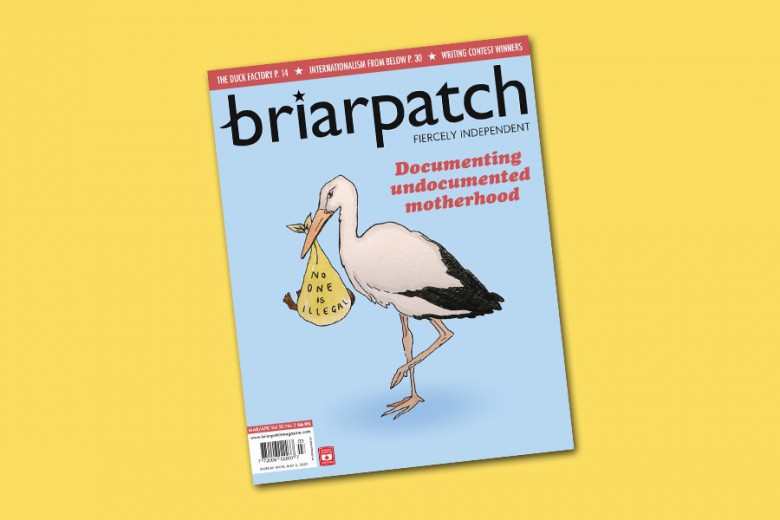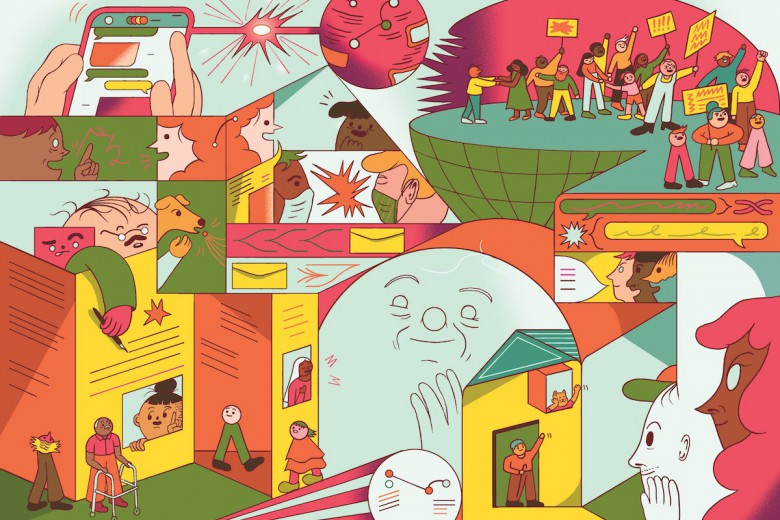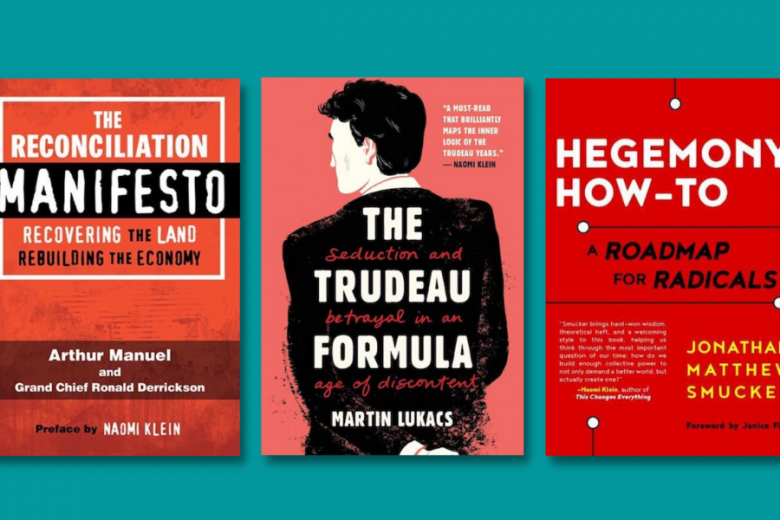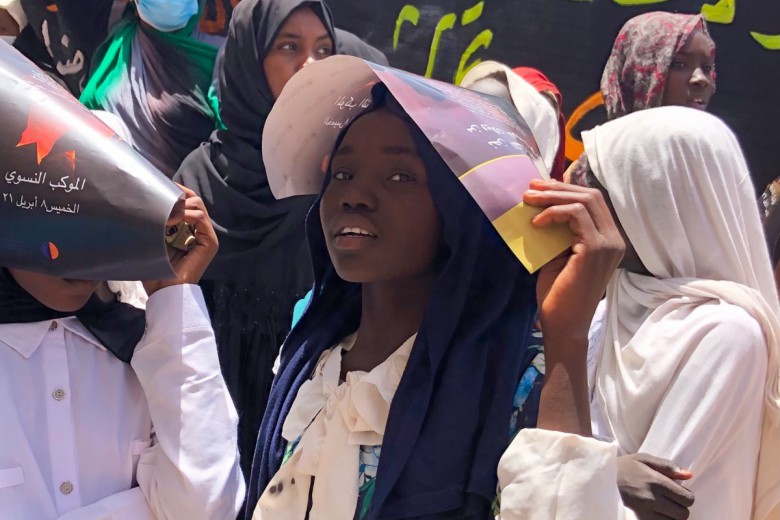
Bert Whitecrow
Social movements can be incredibly affirming and transformative spaces in which we find community, create bonds of solidarity, and begin building the world we want to live in. For many of us, they can also be harmful and even dangerous spaces. Organizing hierarchies and strategies fixated on productivity and output are burning us out, leaving us with little support, and creating conditions that cause us to harm each other.
In her book Pleasure Activism: The Politics of Feeling Good, adrienne maree brown charts a path for organizing rooted in pleasure, healing, and happiness. brown considers the ways people of colour, disabled people, sex workers, and queer, trans, and non-binary people have been denied joy, and she names community, love, and pleasure as ways of fighting the multiple crises we face.
How would establishing a culture of profound care and engaged consent create possibilities for what is attainable in our movements?
“Liberated relationships are one of the ways we actually create abundant justice, the understanding that there is enough attention, care, resource, and connection for all of us to access belonging, to be in our dignity, and to be safe in community,” brown writes.
In Pleasure Activism’s “From #MeToo to #WeConsent” chapter, brown offers survivors, who may be navigating intimacy while overcoming trauma, expansive worlds of full-bodied consent. Not consent in its binary “yes/no” form, but consent as agency over and reclamation of our bodies. Conversations about consent are usually limited to sexual relationships, but what if as organizers we understood consent as the transformative tool that adrienne maree brown writes about? How would establishing a culture of profound care and engaged consent create possibilities for what is attainable in our movements?
To begin to unearth these possibilities, I spoke to Chantelle Spicer and Tashia Kootenayoo, who generously shared with me their visions for relationships and social movements that are deeply embedded in a culture of consent and care.
Chantelle Spicer is an expert in challenging toxic organizing structures that drive a lack of consent and care in and between social movements. She is interested in asking how we can organize from places of care and love toward different futures. As a person reconnecting with their Mi’kmaw and Jewish ancestry, she is especially concerned with how organizers engage with Indigenous consent and how we support Indigenous land and water defenders.
Tashia Kootenayoo is a Stoney-Sioux woman and student advocate who has experience navigating and challenging toxic organizing structures. She is interested in establishing cultures of consent that prioritize a decolonial approach and place Indigenous knowledge at the forefront.
How do you practise consent in your organizing work?
TK A lot of the organizing work we do is to urgently stop something bad that is happening, like police brutality or resource extraction on Indigenous Land. In that context, when you bring up concerns around consent, people can get annoyed because they view these additional steps as a barrier you’ve put between them and getting their message out.
Last year, a fellow student at the University of British Columbia, Mona Wang, was brutally beaten by an RCMP officer during a “wellness check.” A surveillance video went viral, showing the officer dragging handcuffed Mona face down on a hallway floor before stepping on her head. The student unions wanted to put out a statement because we wanted to start lobbying the RCMP to reform their training and procedures regarding mental health, and we wanted UBC to acknowledge that the RCMP are not mental health experts and are not trained for helping students in that kind of situation. However, I thought it was important that before we as a student union put a statement out, we reach out to someone in contact with Mona to ensure that the video of her assault and this statement were something she wanted to be shared.
We knew it was important to advocate on Mona’s behalf, but as a student union, we needed to ensure our statement and our actions were done with the consent of the student involved. Sometimes in these situations, we’re well-intentioned, but we need to ensure that we slow down and remember that we have to get the consent of the people who are involved.
In that context, when you bring up concerns around consent, people can get annoyed because they view these additional steps as a barrier you’ve put between them and getting their message out.
CS Working in a framework of consent means overcoming urgency culture and triage response styles – to be rooted in slowing down. This is a challenging practice because a lot of communities and individuals are facing incredible harm right now and it feels like there’s really no time to slow down. There is an urgency to stop this hurting now because we care about each other. But we have to learn to shift out of this rushing mindset and build long-term solidarity rather than put out immediate, surface-level responses. How can we know what communities really need if we can only rush in?
In a talk I attended a few months ago, a speaker said, “We need to act quickly in slow ways” and that had such an impact on me. Consent can be these very big, slow, intentional relationships and really small simple practices that we can do in our daily life. That’s part of the culture shift for sure and I’m excited to see how those build over time.
How will embedding a culture of consent and care change our movements? What are some best practices for organizers?
Chantelle Spicer
CS I mean, this is the hard part, right? What does embedded consent do for our social movements? This is a really big question that we don’t know the answer to because we’re still experimenting with what that looks like. It’s the kind of question that moves you out of just reacting, to actually thinking: what are we building toward?
It’s going to be different for every movement, and within and between movements. But I can tell you from experience as an individual doing that organizing, you get to feel not only that you’re part of something big but that you matter, and how you feel about the organizing you’re involved in matters. When you invite expansive forms of consent to be practised in your social movements, you create social movements that actually sustain you rather than burn you out.
What consent brings to our social movements is the ability to do this long-term sustained action that is required to make change. Because as we’ve seen, it does take many, many years, decades, half a century, to build even the beginnings of change.
But I can tell you from experience as an individual doing that organizing, you get to feel not only that you’re part of something big but that you matter, and how you feel about the organizing you’re involved in matters.
In her book Emergent Strategy, adrienne maree brown recounts her mentor, Grace Lee Boggs, asking her and fellow organizers what our movements might look like “if we focused on critical connections instead of critical mass.” brown elaborates, suggesting we shift from “mile wide inch deep” movements to “inch wide mile deep” movements and schism the existing organizing paradigm.
The relationships and networks that we’re trying to build are the most important part of our organizing work. Before you figure out the messaging of your campaign or what your final product is going to be, you have to ask, “What does consent mean and look like for us as organizers working together and for the communities that we’re working with?” This needs to be a collaborative learning process rather than the kind of consent training that many have gone to where somebody comes in and tells you what consent is, or you click your way through a module of an online course.
Can you imagine what the environmental movement, for example, would look like if somebody stopped and asked, “What does consent mean before we show up in this space? What does consent mean before we host a rally on stolen Indigenous Land?” It would make for the deep, slow relationships that are required to make the change that we need.
Can you talk more about how certain communities have been operating on a basis of consent since time immemorial, and how capitalism and colonialism have impacted those practices? Is consent culture even possible under capitalism and colonialism?
CS Consent practices are different for every community and, like other parts of culture, they have changed over time. Protocols for access to territory are one example. How do you come on to land that is shared or a part of another’s territory? How do you do that with intention and with reciprocity? Those consent Protocols have been a part of Indigenous nations across the world since time immemorial.
It’s not helpful to think about those Protocols in the past tense, since time immemorial includes right now. We can see that with access to Wet’suwet’en territories at Uni’stot’en – to enter, you have to declare who you are, what it is that you’re doing there, and what you intend to do there for the community and the land before you can get access to the territory and stay at camp. That’s a practice that’s been used at many blockades.
Every person reading this article is probably – hopefully – using consent in some shape or form in their lives, and we really can’t diminish that.
These are practices that show consent culture is possible under capitalism and colonialism. We’re trying to do it every day, in all the ways that we can. The work of building consent practice and culture looks like undermining capitalism and colonialism – systems that rely on lack of consent and on violence – in big and small ways.
Settler government and industry systems are not built for consent practices, but that doesn’t mean that consent can’t happen in our movements, in our relationships, and with ourselves even under colonialism and capitalism. Every person reading this article is probably – hopefully – using consent in some shape or form in their lives, and we really can’t diminish that. It’s happening now on many front lines – to end violence against Indigenous women and to end violence against the land. The vast majority of that work is undertaken by women and girls, youth, and Two-Spirit people and queer people, and folks who face this form of violence head-on every day.
I’m interested in the limitations of consent culture and how it can be or how it has been co-opted under capitalism and colonialism.
CS Indigenous Peoples have known and know holistic, expansive worlds of consent. There’s not really a limit on consent. It shows up in how we access resources with non-human relations like animals and rivers, how we access the lands of our neighbours. It’s only in contexts of colonialism and capitalism and patriarchy that there is a limit on consent.
There are a number of Indigenous people on the front lines of destructive projects and women’s rights movements, and brilliant Indigenous legal scholars like Doug White, Aimée Craft, and Sarah Morales, as well as researchers at the Yellowhead Institute who are generous in teaching about Indigenous forms of consent. It’s not like there is a lack of available knowledge on what that consent looks like if there is listening and learning happening. Yet governments and industry continue to turn a blind eye, avoid accountability, and fail to act in respectful and consensual ways – we can see this in, for example, how government and industry only sought consent from band chiefs, and not hereditary leadership, in order to build the Coastal GasLink pipeline through Wet’suwet’en territory.
They point out that consent cannot be achieved through coercion: multibillion-dollar resource extraction companies cannot have true consent from Indigenous Peoples who are being held economically hostage.
Collectives like the Native Youth Sexual Health Network (NYSHN) and Women’s Earth Alliance (WEA) give us guidance for what consent looks like with Indigenous lands and nations. In their paper “Violence on the land, violence on our bodies,” NYSHN and WEA wrote about what they call the “hostage economy,” in which Indigenous nations or communities are forced, under duress of generational and enforced poverty, to consent to projects that harm their people, lands, and waters, often with promises of financial benefit that pale in comparison to the money accrued by the industry itself. They point out that consent cannot be achieved through coercion: multibillion-dollar resource extraction companies cannot have true consent from Indigenous Peoples who are being held economically hostage.
As for our social movements, trying to pinpoint the limits of consent isn’t necessarily a helpful exercise. We need to think about how our social movements are limited by not enacting consent, not knowing consent in a deep way. It’s a matter of flipping the question because there shouldn’t be limits on it. We need to figure out ways to invite that kind of expansive knowing into our social movements and see what happens.
Tashia Kootenayoo
TK One thing to keep in mind is that consent culture can only work if everything’s in good relations, meaning that you consciously and continuously work to ensure respect and fairness between those you’re working with. For example, ensuring that when you work with Indigenous Peoples, you are maintaining that relationship outside the scope of one project.
The Yellowhead Institute’s Land Back Red Paper discusses how Indigenous consent is ignored, coerced, negotiated, and enforced by government and industry. It introduces the concept of a “spectrum of consent,” a term that encompasses numerous elements of Indigenous consent that de-centre the settler state’s authority and reflect Indigenous law and governance. I think the idea of a “spectrum of consent” could be adapted to an organizing context as well, as long as everyone discusses what those practices look like. By this, I mean we want to include more models of organizing that are less rooted in Western ways of knowing and frameworks, and we want to recognize [that] consent is an ongoing condition in our work. This means we allow others to determine the terms of consent and understand it as an active condition that can be revoked if we are not maintaining those terms in good faith.
What do you think needs to happen in order for us as organizers to operate with consent as a standard practice?
CS We really need to move away from the way that we have learned how to organize. I’m thinking about the labour movement, which has won incredible benefits and protections for workers, especially around occupational health and safety, and while those kinds of big mass movements have their place and space and use, they can’t be the only way that we organize. We can’t continue to measure success only by how many thousands of people show up; to rely on hierarchical structures to lead us toward change; to allow white supremacist ideas of perfectionism and urgency culture to drive our movements. There are old labour movement practices that we need to call forward, like ideas of kinship and small, relational practices like singing and caring for one another that endure the decades it takes to make change.
We need to invite slowness into our movements. We need to take the time to know who our community is and the people that we’re organizing around. I’m thinking about the section of adrienne maree brown’s Emergent Strategy where she writes about the way that birds move, the way fish move, the way that animals migrate. One singular animal knows it’s in deep relation to the seven or so animals around it, and that works in concentric circles outwards.
These ideas come from the land and from each other, and we’re learning to uphold them.
So rather than thinking about a mass of thousands of people, we’re thinking, “What is my neighbour doing? What is my sister doing?” and working together in deep relation with those who are closest to us, knowing what accountability looks like in those relationships and how you’re expected to show up.
That’s really my best advice. I’m not a person who provides checklists or best practices. But these are the principles I’ve been using in my work for Students for Consent Culture and on the front lines of land and water defence. These ideas come from the land and from each other, and we’re learning to uphold them.
I’m sure that in the coming years we’re going to have more solid best practices to follow in terms of what consent looks like in our social movements and especially between social movements, but right now they’re definitely still very emergent and everything is practice. We’re practising to know what that’s going to look like.
How does establishing a consent culture open possibilities for what is attainable in our movements and relationships with one another?
CS We know that we need to do our movements differently and provide intergenerational learning and space for rest, and we’re doing a million experiments to make the world that we want to live in, in our social movements. There’s a tremendous amount of possibility, and probably lots that we don’t even recognize right now, because, unfortunately, it’s not showing up in our movements at the scale that we need it to yet. But it will be a great realization when it does, and I’m really excited about it.
Thank you to Connor Lea Spencer for inspiring and informing this article.






